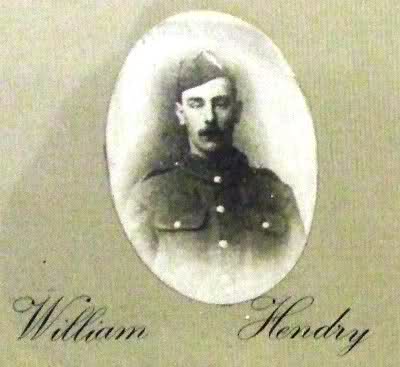6th Black Watch Attack on Y Ravine, Battle of Beaumont Hamel - 13th November 1916
While at Raincheval the men had an opportunity of overhauling their equipment, which had suffered as the result of constant wetting and of the hard wear and tear of trench life. Time was also found for sports of various kinds, and a football match took place between a team of the 6th and another from the 7th Gordons. The game was played amid great excitement and enthusiasm and ended in a draw – three goals each.
That was the last football match which many of the men were destined to witness, for only three days afterwards the long expected attack on Beaumont Hamel took place, and a victory was one at a cost which fell heavily on the Highland Division. On the 11th, which was a Saturday, the battalion marched forward again to Maily Wood, and from then to the Sunday evening the time was spent in making preparations for the attack – bringing up bombs and ammunition, getting trenching tools ready, and performing the various other tasks that must be undertaken before an offensive is carried out.
It was about four o’clock on Sunday evening when the move to the attack position was made. What transpired is best told in the words of Sergeant W Mitchell, Perth, who was wounded in the battle.
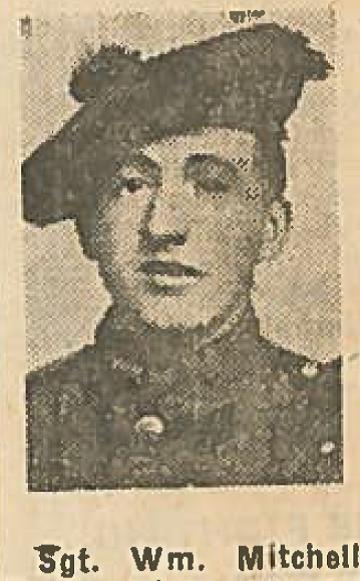
“We assembled outside our huts, about 3 kilos behind the line, after having been supplied with our tools, bombs, etc., not forgetting our special rations. The company commander then came on parade, and after a few words of encouragement from him we moved up by platoons, duly arriving at our destination, the reserve trenches.
It was by this time about 5 15, and we had to remain here for over five hours. About six o’clock we had tea, and then it was a case of each man making himself as comfortable as possible for the next few hours, as everything had already been prepared for moving up to the front line.
At the appointed hour the order was passed along to get ready to move. Instead of using the communication trenches we went by a new route which had been taped out that night for our special benefit. It was a great assistance to us, as it saved us the labour of going along trenches laden up with all the “over the top” necessaries.
When we arrived at our assembly position it would be about midnight, so after getting all the sentries posted we got everything in order for jumping over. We had first to cut a few gaps in our own wire to enable our men to get through without delay. In this operation we had no trouble at all. It was about the quietest night I ever had in the trenches. “It’s the lull before the storm.” Said one man, and we all felt he was right.
We had now everything arranged, so there was nothing more to do but wait patiently for “zero”, as the moment set for an attack is technically called. None of us slept much that night, but everyone was in wonderfully bright spirits. In one of our sections and argument was started as to who would be in the Hun trench first, one we chap from the “Pow” declaring his willingness to bet a whole franc on the business.
At about 5 a.m. we had a hot drink served out to us. It was dignified with the name of “rum punch,” but its actual character was subject for some differences of opinion.
“Its rum with some tea in it,” said one man.
“Away, man,” he was told; “it’s tea with a little rum!”
Whatever the concoction may have been, it was most enjoyable, and it put a nice heat into us.
Time was meanwhile wearing on, and at five minutes before “zero” our platoon was ordered to take up a position in front of our own wire. We had no sooner lain down there when the preliminaries to the attack began.
Everything was times to the second. On our right two large mines were touched off, and the artillery began to play on the Hun front line, together with the trench mortars and Stokes guns, which did magnificent work. There was also an excellent machine gun barrage, the like of which had never been heard before up to that date.
As for the weather, it was so misty we could hardly see ten yards in front of us. This made it very difficult to keep our direction, but we knew which way to go, so we started creeping forward, and as the barrage lifted we made for the enemy trenches.
We had a little difficulty in getting over his wire, and, as he had noticed this with his flare lights, he started bombing us, causing some casualties.
Our other platoons had meantime got through on the left, and working along the trench, they came across the Huns just about the same time as we got through ourselves.
It was our turn then. We cleared the trench of all that was left, and, leaving a number of men to see that no occupants remained in the dug-outs, moved forward towards the second line, along with another Company.
The Germans put up a little more resistance there, but we captured the trench after a bit of a struggle, and took a great number of prisoners, especially from their dug-outs.
By this time my own company had only one officer left, and owing to the darkness in which the attack began some of the companies had got a bit mixed. That did not hinder us any, however, as we all new our final objective, and with a few hurried orders, we moved forward to take the third line. It was at this time I was slightly wounded, and became a subject for the attention of the stretcher bearers, but where I was I could see them getting well forward, and entering the village of Beaumont Hamel.”
The general progress of the operations at Beaumont Hamel may now be described. Precisely at “zero,” following on the shock of the mine explosion on the left, the attacking waves got out under the barrage without difficulty, only one German shell having done damage while the companies lay in the assembly trenches.
Portions of A Company got through the first line and on to a sector known as the Y Ravine, where Lieutenant McLaren had met his death not many days before. Here the attacking line was held up, and a few men were taken prisoner.
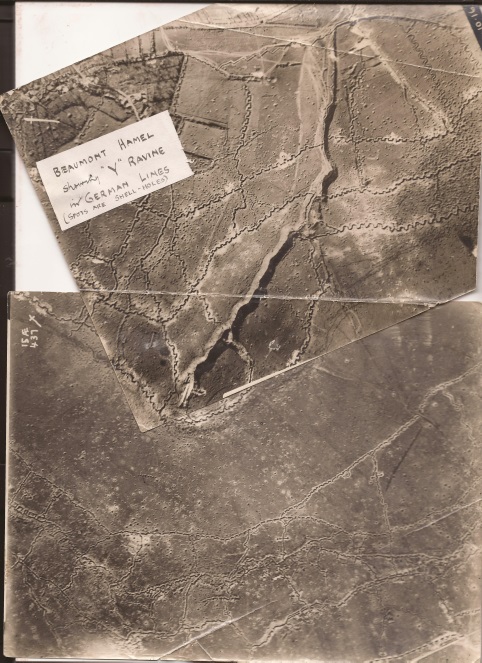
Meantime B Company had got into the German front line, but they found it held by a strong force of the enemy, who was receiving reinforcements from the Y Ravine, and they were forced to fall back, and gradually collected in the old British front line. Some of the second wave got through at once, and, moving to the left got in touch with the 5th Seaforth Highlanders, and with them penetrated the second line.
During this period Captain Ferguson, of D Company, was killed, and Lieutenant West (B Company) wounded, and Major Young Auchterarder (C Company), was sent back to the dressing station suffering from shell shock. Shortly afterwards Lieutenant Lindsay, of B Company, was sent back to the aid post for the same reason, and Lieutenant Leslie, of the Lewis Gun Section, was placed in command of the men, about 70 in all, who were holding the old British Line.
About an hour and a half after the attack began the Headquarters Staff sent out an observation party, but none returned, and Capt. and Adjutant R Bruce Ellis went out with his orderly and a bombing sergeant. They had just reached the German trenches when they heard the shout of some of their own wounded in a shell hole near at hand. Capt. Ellis and his two companions went to assist, and whilst tending the men a rifle shot went off about 20 yards distant. The sergeant was hit, and, turning to find whence the shot had proceeded, Capt. Ellis saw in an adjoining shell hole a German sniper, who fired the shot that ultimately cost the Captain his life.
The orderly went for assistance, but lost himself in the mist, and the wounded Captain crawled back until he met the stretcher bearers. He was then taken with all speed to hospital, to die suddenly a week afterwards – the 21st November – of hemorrhage.
As Captain Ellis did not return, Lieutenant Leslie sent out battle patrols, who reported that the Germans were holding the salient in force, and could be seen through the mist standing up ready to fire at any one who approached.
During all this time one enemy machine gun from the far side of the Ravine and two from the front line were sweeping No Man’s Land, making progress very difficult.
Between ten o’clock and noon the situation was very critical. The Germans were still holding the salient strongly, and it became clear that the best chance of capturing the position would be to effect an entry at the west end of the Ravine, Reinforcements were asked for from Brigade headquarters, and a bombing party, consisting of an officer and 25 men, were promised.
Before these reinforcements arrived, however, an attack on the position was gallantly led by Lieutenant Leslie, who acted on information from his patrols and the advice of Lieutenant Meff, the brigade bombing officer. The attack was carried out with great impetuosity and success, and 103 prisoners were captured, while a number of 6th Black watch men who had previously penetrated the line and had been taken prisoner were now liberated.
Those who had been left in the old British line, numbering about 30, were then sent forward to strengthen Lieutenant Leslie’s little party, which was spread out and ordered to clear the whole salient of the enemy, and get in touch with the Gordons on the right.
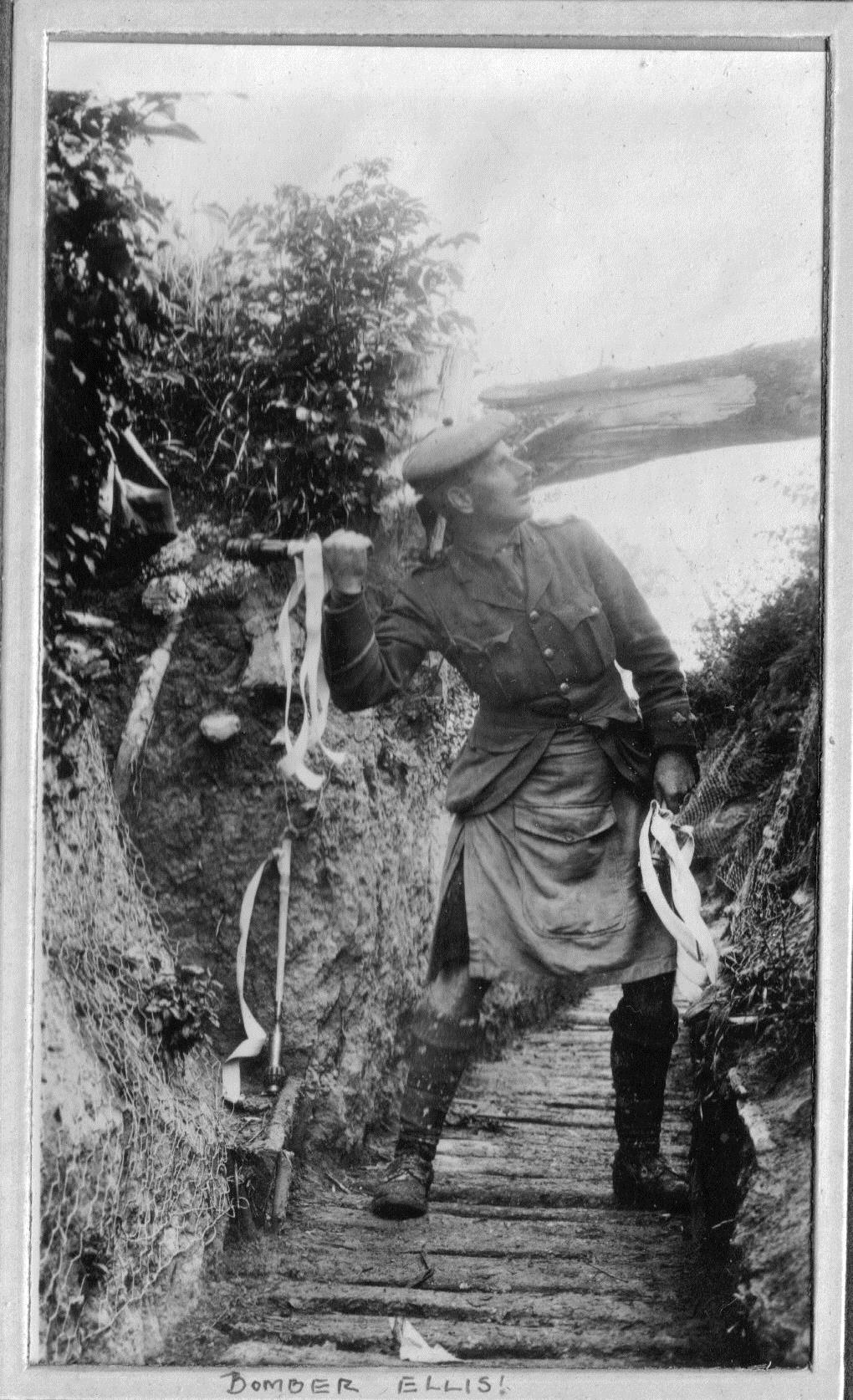
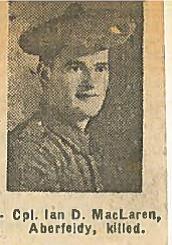
About an hour later the whole salient had been captured, and the German resistance at that point was at an end. One German machine gun had been captured, one knocked out by a bombing party, and all the German snipers, who had been very active, had been gradually silenced. The battle headquarters of the battalion were moved forward, and Signaling Sergt. Stewart promptly ran out a line and established telephone communications with the brigade. It was performing this duty the sergeant was severely wounded.
Meantime the bombing party from the 4th Gordon Highlanders had arrived, and the officer in command was ordered to advance to the point of the salient and assist the men of the men of the 6th in pushing further on. Touch was then joined with Lieut. Beatson and a platoon of the 7th Black Watch, who had been attached to A Company for the attack, and who had been isolated in the Ravine with 20 wounded men. The advance was then begun to the second German line.
About this time Lieut. Barr, who had acted Adjutant since Captain Ellis was wounded, collapsed from exhaustion. Lieut. Lindsay had meantime re-joined, and did gallant work in the German second line, reorganizing and encouraging the men; while Lieut. Leslie went forward with five men to reconnoiter the third enemy line. About this juncture the 5th Gordon Highlanders arrived to reinforce the attacking troops, and the whole advance became very rapid, the German opposition having practically broken down.
By about 8 p.m. the 6th had reached all their objectives, and had joined hands with the 4th Gordons at the “green line”. Capt. Innes being sent forward to take command of the companies established there. He went forward accompanied by Lieut. Conder, and, having collected a Lewis gun team and about 20 men from the German third line , with Lieuts. Watt and Raynor joined the battalion on the “green line”. After reconnoitering the position, Capt. Innes arranged with the senior officer of the Gordons to move his men a little to the right, and put two Lewis gun teams to cover the approach, thus filling the gap between the battalions.
During the night the line was consolidated under heavy shell fire, which killed three men and wounded twelve others. Shortly after mid-day on the 14th, the 6th were relieved, handing over the position to the 4th Gordon Highlanders.
Worn out after two days of hard fighting, with uniforms tattered and torn, and plastered from head to foot with mud, the men of the 6th Black Watch straggled wearily back to camp at Mailly Wood – comfortless at the best, but welcome now because it offered a chance to rest.
They had been through the hardest fight of the campaign, and for nearly 24 hours had battled on in the midst of fire from German guns. Yet when the roll was called there were surprisingly few who did not answer to their names; not that the 6th had escaped lightly, but that the battalion’s losses seemed small in proportion to the hard and prolonged fighting it had gone through.
Officially the casualties in the battle were reported as follows:-
N.C.O.’s and men –
Killed 37
Missing 43
Wounded 125
Of those first reported missing, many were afterwards accounted for, having found their way through other aid posts wounded.
Included in those Killed we three men from our area : – Corporal Ian D MacLaren, Aberfeldy, Private William Hendry, Lawers and Private John McIntyre, Grandtully.
The officers numbered in the casualty list were :-
Killed – Capt. T Ferguson, Lieut. Cairns, Lieut. Begg.
Wounded – Major Young, Lieut.’s. West, Raynor, Calvert, Carr, Weir, Leslie, Lindsay, Strathairn, Keay and Capt. Ellis, the last three subsequently succumbing to their wounds.
As if to show how ironic fates could be, a keen frost ensued immediately after the battle, hardening the ground and producing the very conditions which had been so much desired, and which would have saved both time and casualties.
Following on the battle the chaplain went up to the front lines with a burial party to collect the dead, and so persevering were they in their labours that every casualty was accounted for.
